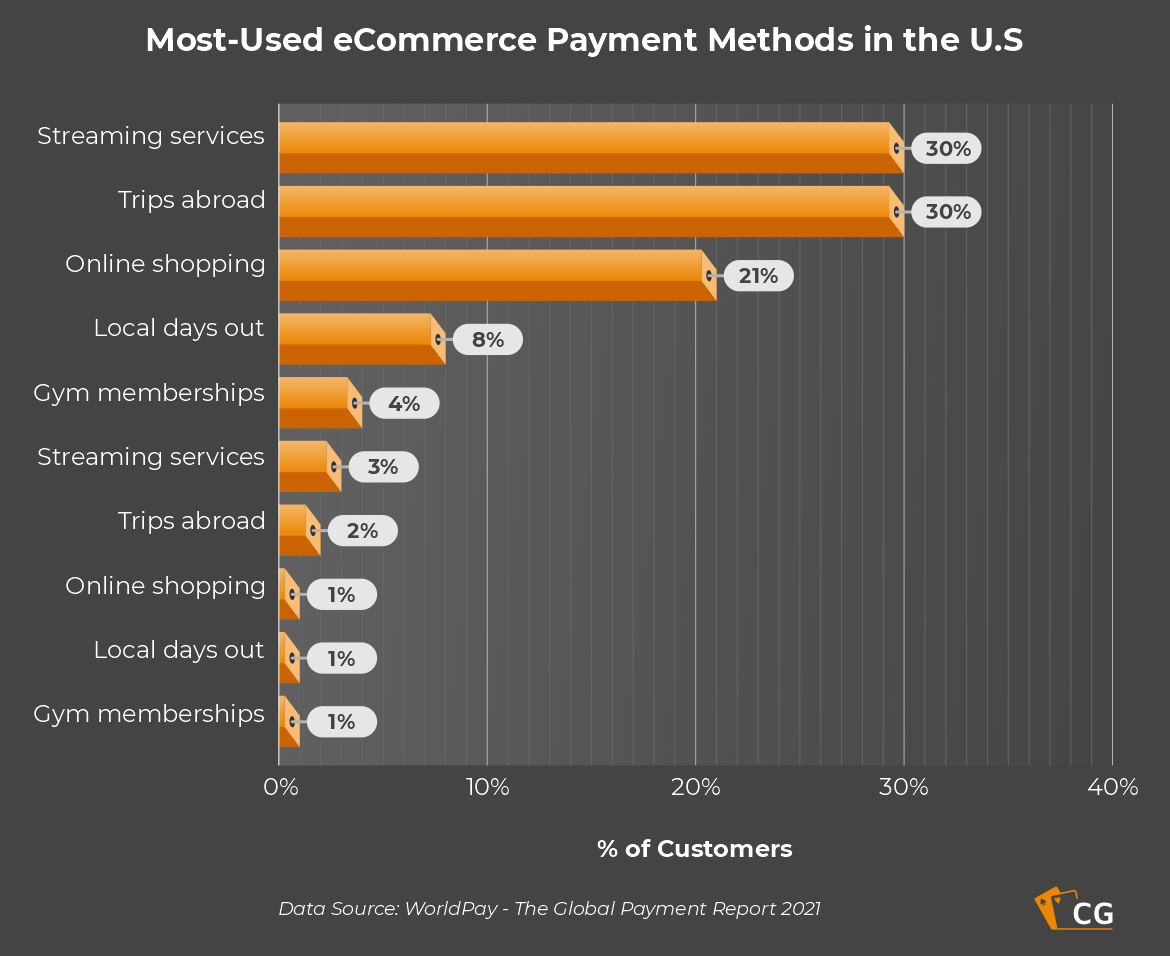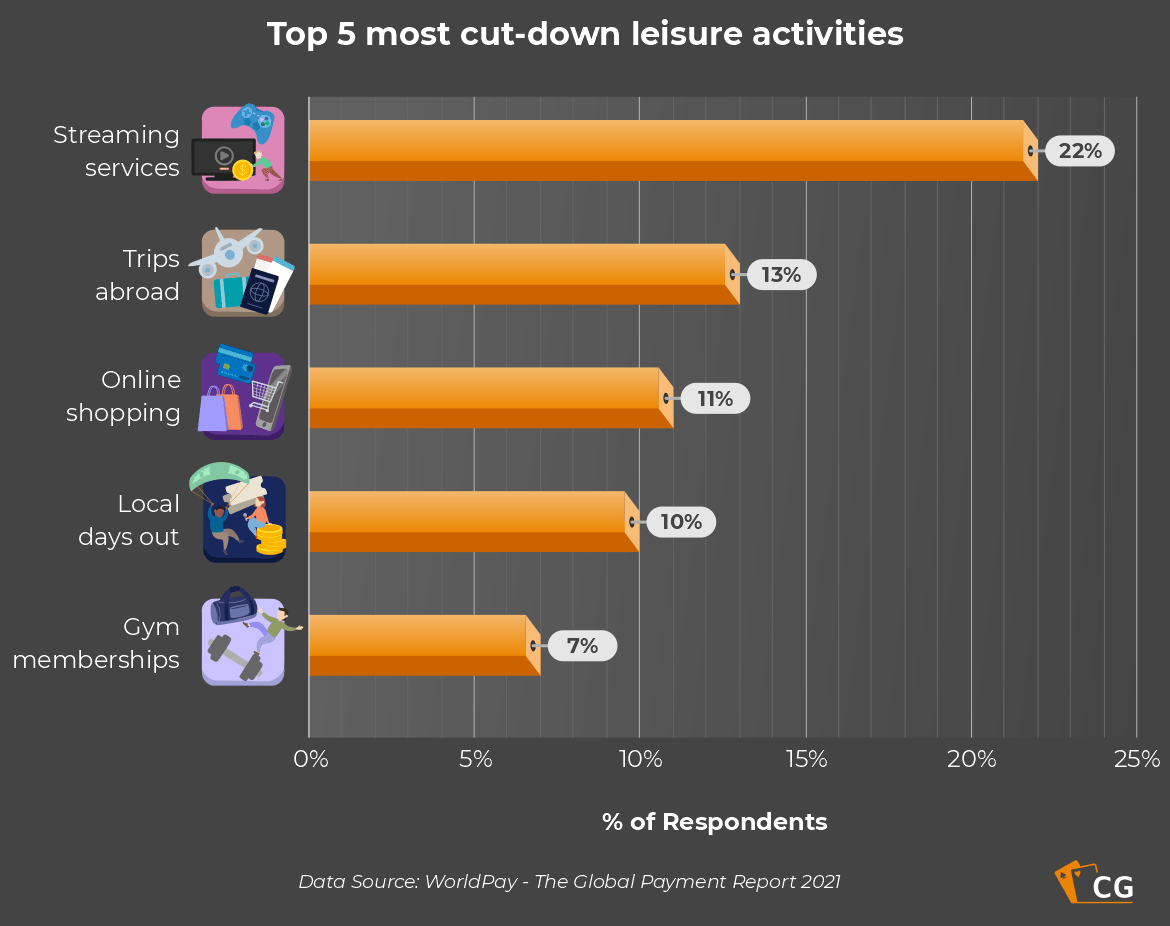Pricey Pastimes: The Leisure Spending Survey
Everybody has felt the pinch this year so far, as the cost of living has surged due to rising fuel costs, low annual salaries and food costs jumping by a huge 10.8% in the last year, according to the U.S. Bureau of Labor Statistics. This has caused many of us to turn to budgeting plans – following money-saving tips like buying reduced groceries, redeeming coupons and avoiding topping up gas. But how does watching purse strings affect our day-to-day quality of life, namely when it comes to leisure activities?
The Leisure Spending Survey, from CasinoGuardian, asked 2,000 US-based adults about what payment methods they’re currently relying on for leisure activities, and which they’ve had to cut back on to accommodate rising costs. It also reveals how people’s attitudes around spending money have changed since the start of the year, and how their decision-making has altered as a result of scrimping and saving.
Preferred Payment Methods Revealed
Everybody has a preferred way to pay whilst out and about – whether you’re a firm supporter of carrying cold hard cash, or if you prefer sticking spending on a credit card and paying it back the next month. But given the rising cost of living, how are Americans changing the way they pay for leisure activities, such as a trip to the movies, a meal out or buying new clothes? The survey found that the majority of people are putting leisure costs on their credit card (27%) – and for 54%, the main reason for doing so is that they don’t have the money to cover a spontaneous drink or date night on their debit card.
For a huge 15% of those surveyed, they’re opting to use Buy Now Pay Later services like Klarna, Afterpay and PayPal when funding their leisure activities online – such as shopping for new clothes – whilst a further 8% are borrowing money from their friends and family to cover spontaneous purchases. Whilst all of these options can be great for people who are sure they can pay it off in the future, they’re also running the risk of being caught short in the future, or ending up in debt as a result of rising borrowing costs.
It may just be that people feel comfortable using these payment methods for leisure activities as they can scale them up and down where needed (for example, only springing for a cheap main, rather than also getting a starter and dessert when out with friends). But it’s not just leisure activities that are seeing people turn to alternative payment methods in order to avoid making an immediate dent in their bank account.
According to the most recent Global Payment Trend Report from WorldPay, the majority of people in the US are turning to their credit card to cover purchases made online – including those using doordash, deliveroo or uber – or are using mobile wallets, such as ApplePay. Interestingly, Buy Now, Pay Later is more commonly-used than a direct debit or cash – probably because it’s widely available on online transactions made from most retailers.
Most-Used eCommerce Payment Methods in the U.S.

But regardless of how people choose to fund their free time, the question remains about whether their paycheck is covering the key costs. The survey also asked respondents about how their spending habits have changed since the start of the year as a result of rising costs, regardless of how essential their expenditure is. The results show that the majority of people (79%) have had to alter their spending in some way, with 1 in 5 (21%) having to do so ‘significantly’. The demographic most affected by cutting costs were those aged 25-34, who don’t yet earn as much as their older peers and yet are still having to cover a lot of the same costs – such as fuel, groceries, medical insurance and taxes.
Most Limited Leisure Activities
So, with people having to focus their paycheck on covering essential costs, how are their social lives shaping up? The survey looked to reveal which leisure activities people are having to put on the back burner, and what they’ve swapped them out for to still stay stimulated in their downtime. And it seems that one positive impact of cutting back costs is that more people are swapping their streaming service subscriptions for reading – with an impressive 22% of those surveyed having to cancel their Netflix, Hulu or Amazon accounts, but instead investing in a library card or e-reader.
Other areas where people have had to cut costs came out as online shopping (11%) and trips abroad (13%), whilst almost 1 in 10 (9%) of people have had to put their love lives on hold, as they can no longer afford to go on dates with prospective partners. Sadly, 7% of people surveyed have had to reign in their spending when it comes to furry friends, either putting their plans to get a dog on hold, or spending less on treats and toys for their pet. Other areas that saw reduced spending were games – either online slots or console titles – and gym memberships.
Top 5 most cut-down leisure activities

The survey also asked people general questions about statements they could relate to, with the most-relatable statement being that people have had to use their savings or emergency funds – such as a 401k – in order to cover leisure costs, as their normal paycheck has only covered essential expenditure (19%). Quite a few people have had to cancel trips away or holidays that they’d booked last year due to no longer having the costs (10%), whilst almost a third (29%) of millennials don’t know how they’ll be able to afford a house in their lifetime, unless they win the lottery or inherit a large sum.
Interestingly, some people are turning more to investments and cryptocurrencies to keep their money secure (8%), while others are basing their next career move on how it can benefit them financially, with 1 in 10 (9%) saying they’re looking to switch jobs earlier than anticipated in order to get a higher salary. For most of us, though, tightening the purse strings means seeing less people and getting out less, with 17% of people saying they’re unhappy with their social life at the moment, but can’t change it without more money.
Summary
Regardless of what the next year looks like in terms of rising costs, it’s key that people still make time for leisure activities and downtime to unwind from the working week. It’s encouraging that some people are swapping out their costly hobbies – such as buying new video games or going to the cinema – for money-saving alternatives, such as playing free games online or reading instead. However you like to relax, we hope that you can do it in an affordable and sustainable way, and put your feet up like you deserve.
